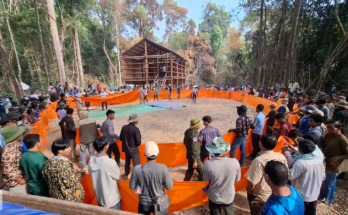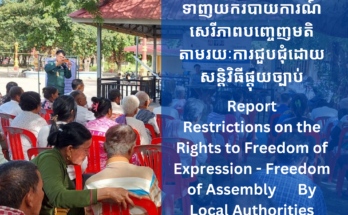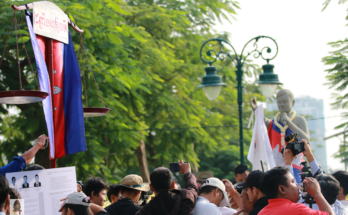4 April 2022 – We, the undersigned organisations, remain deeply concerned about Cambodia’s failure to conduct a thorough, independent, transparent, and effective investigation into the suspected enforced disappearance of Thai activist Wanchalearm Satsaksit and the resulting impunity. As the UN Committee on Enforced Disappearances (CED) prepares for a preliminary review of the situation of enforced disappearances in Cambodia on 5 April 2022, we call on the CED to address Cambodia’s persistent failure to conduct a prompt and thorough search for Wanchalearm to determine his fate and whereabouts or to effectively and transparently investigate his disappearance.
We stand in solidarity with Wanchalearm and his family and all victims of enforced disappearance, and call on Cambodia to address apparent failures of the investigating to date, and to immediately disclose any information they may have about his fate and whereabouts, and to ensure truth, justice and reparations for his family”. We agree with the CED that “the very nature of enforced disappearance [is] a continuous crime” which presents grave risks to the rights to life, liberty, security of person, freedom from secret detention and torture, as well as the right to family life. Families of those disappeared have faced incalculable suffering, while being deprived of the right to obtain redress and have closure.
The CED has previously expressed concern over Cambodian authorities’ failure to define and conduct thorough, impartial, and independent searches and investigations into reported enforced disappearances, a pattern that continued with Wanchalearm’s case. In June 2020, Wanchalearm was abducted in broad daylight outside his apartment building while living in exile in Phnom Penh. Wanchalearm is an outspoken critic of the Thai government and the subject of criminal charges in Thailand. His abduction was captured on CCTV footage, which includes images of the vehicle used and its license plate, as well as by eyewitnesses. Wanchalearm’s sister, Sitanan Satsaksit, also overheard part of the abduction as she was on the phone with him at the time. General Chhay Kim Khouen, spokesman of the National Police, and Khieu Sopheak, spokesman for the Ministry of Interior, initially dismissed the abduction as “fake news” while another official implied that the government would not investigate the matter because there was no formal complaint.
Authorities later denied Wanchalearm had been in Cambodia at the time despite clear evidence and instead focused on issues irrelevant to determining his fate and whereabouts such as whether he had proper immigration documentation. Amid widespread international condemnation, and only after Sitanan Satsaksit filed a formal complaint with the Phnom Penh Municipal Court on 8 July 2020, Cambodian authorities finally opened a criminal investigation in September 2020. Despite Sitanan giving testimony and evidence to a Phnom Penh court in December 2020 and early 2021, there have been no leads in the investigation. Subsequent appeals for information on his disappearance and the progress of the investigation from Wanchalearm’s family have been met with silence. In Thailand, Thai authorities have twice threatened Sitanan with criminal charges after she spoke at events in September and December 2021 about her brother’s disappearance and the need to enact Thailand’s draft law on the prevention and suppression of torture and enforced disappearances.
Wanchalearm’s disappearance is a chilling reminder of the 2007 cross-border disappearances of two Vietnamese pro-democracy and labour activists from Cambodia. For example, Le Tri Tue, a Vietnamese dissident, disappeared in Phnom Penh in 2007 after applying for asylum and remains missing.
Failure to effectively investigate his abduction calls into question the authorities’ compliance with Cambodia’s obligations under the International Convention for the Protection of All Persons from Enforced Disappearance (ICPPED), to which Cambodia became a state party in 2013. Specifically, Cambodia is in violation of its duties under international human rights law to undertake a thorough and impartial investigation without delay, take necessary measures to hold those involved criminally responsible, and guarantee access to information to the families of the victims and those with a legitimate interest. In addition, unconscionable delays in the search for a disappeared person are inconsistent with the Guiding Principles for the search for disappeared persons, including to presume the person is alive, respect human dignity, begin without delay, use information in an appropriate manner, and respect that the search is a continuing obligation until the fate of the disappeared is known.
The CED opened its 22nd session on 28 March and will develop a List of Issues that will form the basis for the review of Cambodia’s first report under Article 29 of the ICPPED. This report was due in 2015 but was not submitted by the Cambodian government until 2021.
This joint statement is endorsed by:
- Sitanan Satsaksit and Family
- Affiliated Network for Social Accountability (ANSA), Cambodia
- Alliance for Conflict Transformation (ACT), Cambodia
- Ain o Salish Kendra (ASK), Bangladesh
- Asian Forum for Human Rights and Development (FORUM-ASIA)
- Asian Resource Foundation (ARF), Thailand
- Association of Women for Awareness & Motivation (AWAM), Pakistan
- Banglar Manabadhikar Suraksha Mancha (MASUM), India
- Bytes for All, Pakistan
- Cambodia’s Independent Civil Servants Association (CICA)
- Cambodian Center for Human Rights (CCHR)
- Cambodian Food and Service Workers’ Federation (CFSWF), Cambodia
- Cambodian Human Rights and Development Association (ADHOC), Cambodia
- Cambodian Institute for Democracy (CID), Cambodia
- Cambodian League for the Promotion and Defense of Human Rights (LICADHO), Cambodia
- Cambodian Youth Network (CYN), Cambodia
- Center for Alliance of Labor and Human Rights (CENTRAL), Cambodia
- Center for Human Rights and Development (CHRD), Mongolia
- Center for Prisoners’ Rights (CPR), Japan
- Coalition of Cambodian Farmers Community Association (CCFC), Cambodia
- Committee for Free and Fair Elections in Cambodia (COMFREL), Cambodia
- Commonwealth Human Rights Initiative (CHRI), India
- Cross Cultural Foundation (CrCF), Thailand
- Defence of Human Rights (DHR), Pakistan
- Dignity-Kadyr-kassiyet (KK), Kazakhstan
- Equitable Cambodia (EC), Cambodia
- Human Rights Commission of Pakistan, Pakistan
- Human Rights Lawyers Association (HRLA), Thailand
- Independent Democracy of Informal Economy Association (IDEA), Cambodia
- The Indonesian Human Rights Monitor – Inisiatif Masyarakat Partisipatif untuk Transisi Berkeadilan (Imparsial), Indonesia
- International Federation for Human Rights (FIDH)
- Korean House for International Solidarity (KHIS), South Korea
- League for the Defence of Human Rights in Iran (LDDHI), Iran
- Madaripur Legal Aid Association (MLAA), Bangladesh
- Maldivian Democracy Network (MDN), Maldives
- Manushya Foundation, Thailand
- Odhikar, Bangladesh
- People’s Empowerment Foundation (PEF), Thailand
- People’s Watch, India
- Programme Against Custodial Torture & Impunity (PACTI), India
- Progressive Voice, Myanmar
- Safety and Risk Mitigation Organization (SRMO), Afghanistan
- Sahmakum Teang Tnaut (STT), Cambodia
- Suara Rakyat Malaysia (SUARAM), Malaysia
- Thai Lawyers for Human Rights (TLHR), Thailand
- The Cambodian NGO Committee on CEDAW (NGO-CEDAW), Cambodia
- Think Centre, Singapore
- Transparency International Cambodia (TIC)
- Vietnam Committee on Human Rights (VCHR), Vietnam
- Youth Resources Development Program (YRDP)



